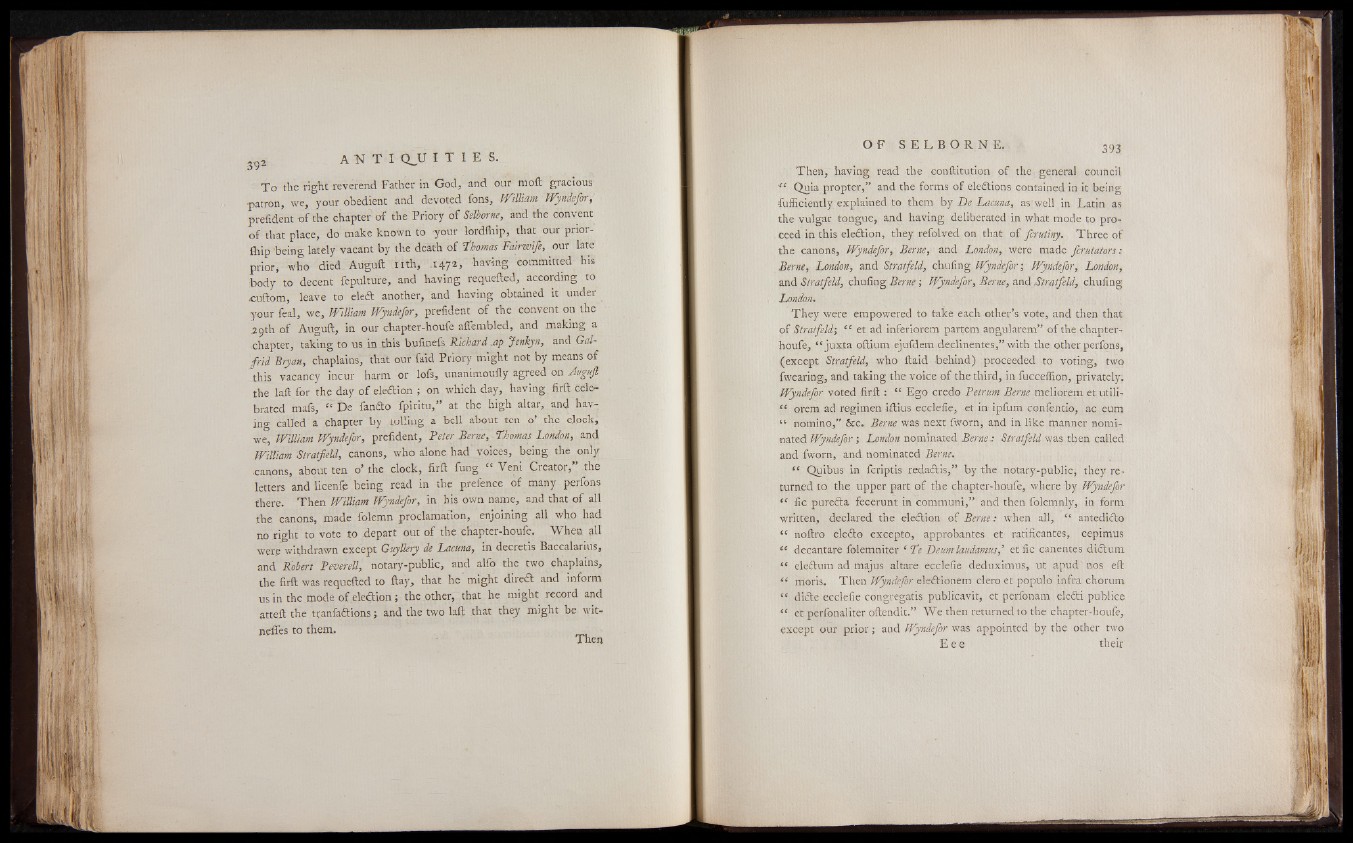
T o the right reverend Father in God, and our rnoft gracious
•patron, we, your obedient and devoted Tons, miliant Wyndefor,
prefident o f the chapter of the Priory of Selborne, and the convent
of that place, do make known to your lordthip, that our prior-
fhip 'being lately vacant by the death of Thomas Fairwife, our late
prior, who died Auguft n th , ,1472, -having committed his
body to decent fepulture, and having requefted, according to
■ cuftom, leave to cleft another, and having obtained it under
your feal, we, William Wyndefor, prefident of the convent on the
29th of Auguft, in our chapter-houfe affembled, and making a
chapter, taking to us in .this bufinefs Richard xtp Jenkyn, and Gal~
frid Bryan, chaplains, that our faid Priory might not by means of
this vacancy incur harm or lofs, unanimoufly agreed on Auguft
the laft for the day of eleftion ; on which day, having firft celebrated
mafs, c< De ianfto fpiritu, at the high altar, and having
called a chapter by tolling a bell about ten o’ the clock,
we, William Wyndefor, prefident, Peter Berne, Thomas London, and
William Stratfeld, canons, who alone had voices, being the only-
.canons, about ten 0’ the clock, firft fung “ Veni Creator,” the
letters and licenfe being read in the prefence of many perfons
there. Then William Wyndefor, in his own name, and that of all
the canons, made folemn proclamation, enjoining all who had
no right to vote to depart out of the chapter-houfe. When all
were withdrawn except Guyllery de Lacuna, in decretis Baccalarius,
and Robert Fever ell, notary-public, and alfo the two chaplains,
the firft was requefted to ftay, that he might direft and inform
us in the mode of eleftion; the other, that he might record and
atteft the ttanfaftions; and the two laft that they might be wit-
neffes to them.
Then
Then, having read the conftitution of the general council
jSj Quia propter,” and the forms of eleftions contained in it being
fufliciently explained to them by De Lacuna, as'well in Latin as
the vulgar tongue, and having deliberated in what mode to proceed
in this eleftion, they refolved on that of ftrutiny. Three of
the canons, Wyndefor, Berne, and London, were made fcrutators:
Berne, London, and Stratfeld, chufing Wyndefor; Wyndefor, London,
and Stratfeld, chufing Berne; Wyndefor, Berne, and Btratfeld, chufing
London.
They were empowered to take each other’s vote, and then that
of Stratfeld; “ et ad inferiorem partem angularem” of the chapter-
houfe, “ juxta oftium ejufdem declinentes,” with the other perfons,
(except Stratfeld, who ftaid behind) proceeded to voting, two
fwearing, and taking the voice of the third, in fucceffion, privately;
Wyndefor voted firft : “ Ego credo Petrum Berne meliorem et utili-
“ orem ad regimen iftius ecclefie, et in ipfum confentio, ac eum
“ nomino,” &c. Berne was next fworn, and in like manner nominated
Wyndefor ; London nominated Bernes Stratfeld was then called
and fworn, and nominated Berne.
“ Quibus in fcriptis redaftis,” by the notary-public, they returned
to the upper part of the chapter-houfe, where by ffyndejbr
“ fic purefta fecerunt in communi,” and then folern-nly, in form
written, declared the eleftion of Berne: when all, “ antedifto
“ noftro elefto except©, approbantes et rarificantes, cepimus
“ decantare folemniter ‘ Te Deumlaudamus,’ et fic canentes diftum
I eleftum ad majus altare ecclefie deduximus, ut apud' nos eft
“ moris. Then Wyndefor eleftionem clero et populo infra chorum
“ difte ecclefie congregatis publicavit, et perfonam electi publice
“ et perfonaliter oftendit.” We then returned to the chapter-houfe,
except our prior; and Wyndefor was appointed by the other two
E e e their
f
m